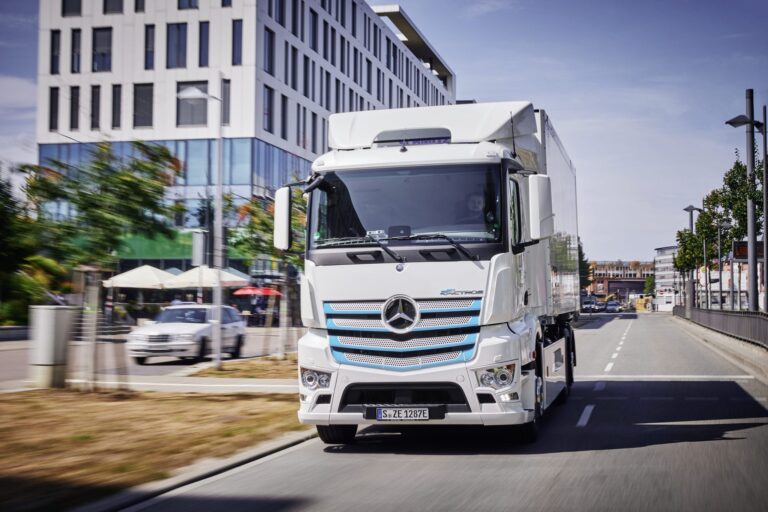Daimler has provided a progress report on the testing and development of its Mercedes-Benz eActros battery-electric truck, which has been evaluated under real-world conditions by customers for over a year.
Some tens of thousands of test kilometres have been driven by customers since autumn 2018 – when Mercedes-Benz Trucks began to hand over ten 18- and 25-tonne eActros trucks to customers in Germany and Switzerland – with Daimler maintaining a close exchange with drivers, dispatchers and fleet managers since.
According to test results and feedback gathered so far, heavy-duty short-radius distribution with local zero emissions and quiet operation is possible.
Specifically, findings show that a range of up to 200km (124 miles) is a realistic figure for eActros, regardless of payload, route or topography.
Thus, in terms of availability and performance, Daimler believes “the eActros is in no way inferior to a conventional diesel-engined truck in urban traffic, on motorways or in overland traffic”.
Customers have used the eActros for tasks usually carried out by conventional diesel-powered vehicles – but in different sectors and categories – including transportation and delivery of groceries, building supplies and raw materials.

As such, the test vehicles have been fitted with a variety of bodies, ranging from refrigerated and box bodies to bulk goods and tarpaulin bodies.
Andreas von Wallfeld, head of marketing, sales and services at Mercedes-Benz Trucks, said: “We’re on the right track with the concept behind the Mercedes-Benz eActros. For me, this is the key finding after more than a year of extremely intensive real-world trials with our battery-electric heavy-duty short-radius distribution truck.”
The eActros is based on the frame of the Mercedes-Benz Actros. However, the vehicle’s architecture has been designed around an electric drive system and thus features a high percentage of vehicle-specific components.
Two electric motors near the wheel hubs of the rear axle provide the drive, each delivering an output of 126kW and 485Nm of torque. Furthermore, the transmission ratio used sees this brought up to 11,000Nm on each wheel. The drive power is therefore on par with a conventional truck.
Lithium-ion batteries with 240kWh capacity provide the eActros with the required energy. Depending on the available charging output, the batteries can be fully recharged within two hours (at 150kW).
Testing and development of eActros is sponsored as part of the Concept ELV² project by the German Federal Ministry for the Environment and the Federal Ministry for Economic Affairs and Energy.
Series production of the eActros is scheduled to start in 2021.





